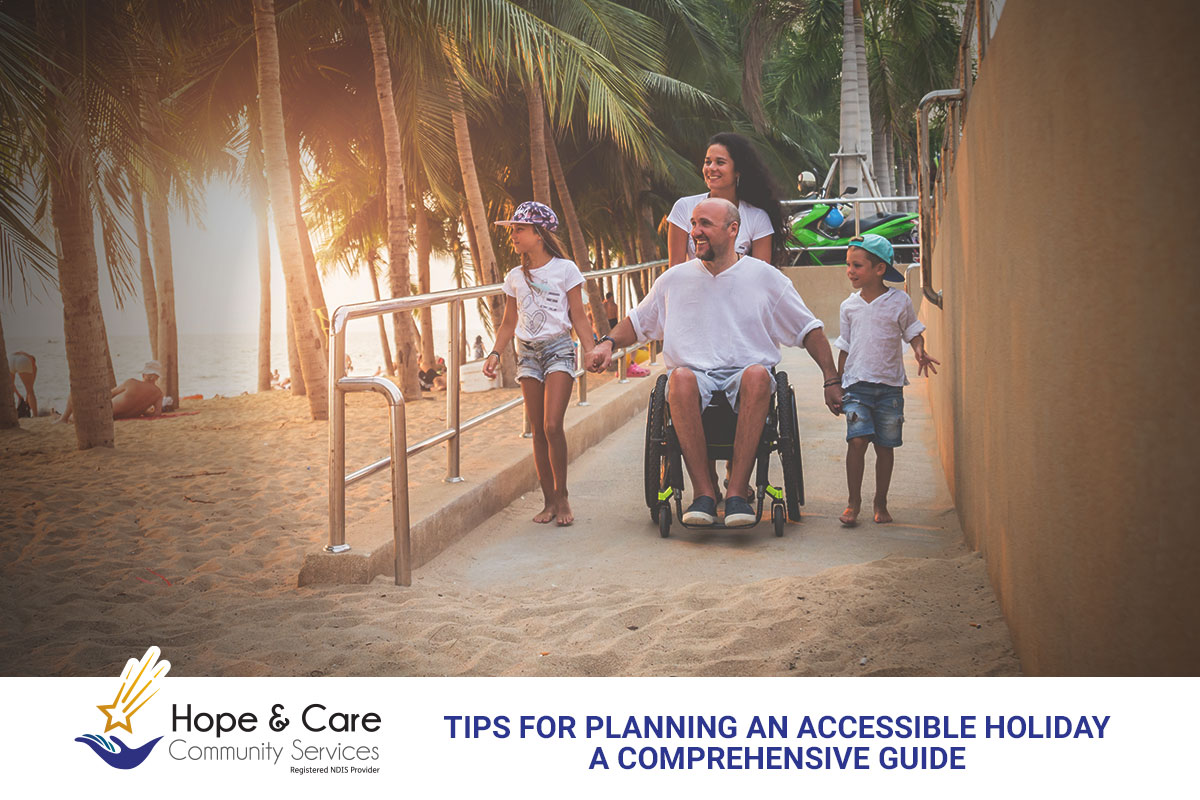
Planning a holiday is an exciting experience, but ensuring it is accessible can feel complex. With a few strategic steps, you can create a smooth, enjoyable trip where all details are accounted for.
What We will Cover:
- Securing accessible accommodations
- Planning travel logistics
- Choosing accessible activities
- Organising required equipment
- Creating a support plan
Book Accessible Accommodations in Advances
Accessible accommodations are crucial to comfort, and specific needs can vary widely. To ensure your stay is smooth and hassle-free:
- Research Accessible Properties: Websites like Booking.com, Airbnb, and dedicated platforms (e.g., Wheelchair Accessible Holiday Accommodations) offer filters for accessibility. Confirm details by phone, asking about ramps, roll-in showers, and in-room adjustments.
- Verify Accessibility and Request Photos: Not all accommodations meet the same standards of accessibility. Request photos and written confirmation to avoid surprises.
- Book Early: Accessible rooms are often limited, so reserving well in advance increases the likelihood of availability.
Arrange Accessible Transportation
Getting to and moving around your destination smoothly is essential for a stress-free trip. Plan ahead by:
- Confirming Accessible Flights and Transfers: Inform airlines and transport providers of any mobility or equipment needs. Many airlines provide priority boarding, accessible seating, and assistance for those with disabilities, but notifying them early is key.
- Researching Local Accessible Transport: Public transit accessibility varies; explore options like wheelchair-accessible taxis, shuttles, or car rentals equipped for wheelchairs. Contact local transit authorities to confirm accessible routes and schedule adjustments as needed.
Tip: If renting a car, request hand controls or other adaptive modifications in advance.
Prepare or Rent Essential Equipment
Whether you are bringing your own equipment or renting, making these arrangements early ensures everything is ready on arrival.
- Determine What to Bring vs. Rent Locally: If you are flying, check baggage requirements for medical devices and contact the airline regarding special storage. In cases where travel weight is a concern, look for local rental services for items like wheelchairs, hoists, or portable ramps.
- Verify Electrical Needs: For electronic equipment, confirm that batteries and chargers are compatible with your destination’s voltage and plugs.
Pro Tip: Having a backup charger and adapter can be a lifesaver if you are reliant on power-driven mobility aids.
Research Accessible Attractions and Activities
Enjoying a new place is easier when you know which spots and activities are fully accessible.
- Use Online Resources: Websites like Accessible Travel Online and Limitless Travel offer reviews and recommendations for accessible destinations.
- Contact Venues Directly: Verify each location’s accommodations, such as accessible parking, ramps, elevators, and sensory-friendly environments. This is especially useful for popular tourist sites, where accessibility varies.
- Choose Destinations with Diverse Accessibility Options: Some places offer adaptive options for outdoor activities, like beach wheelchairs, accessible hiking trails, or audio tours, enhancing your experience.
Tip: Consider downloading local maps highlighting accessible facilities, bathrooms, and pathways to plan routes.
Consider Support Needs and Travel Companions
Many travellers with disabilities prefer to travel with support persons, especially for longer trips. Planning for this ensures everyone is prepared and supported.
Organise Additional Support: For NDIS participants, work with your support coordinator to include holiday support, if required, in your plan. For personal care needs, consider contracting a local provider if an external support worker is required.
Discuss and Budget for Companion Costs: Calculate the travel and accommodation expenses for any companions or support workers joining you. Many hotels offer discounts for support workers, so ask about discounts when booking.
Tip: Share itinerary details with your travel companions and have a list of emergency contacts ready.
Ensure Medical and Emergenscy Preparedness
Preparing for potential emergencies can add an extra layer of peace of mind, especially in unfamiliar places.
- Have a Medical Kit and Emergency Info: Pack any necessary medical supplies, along with a “just in case” kit containing items like extra medications, doctor’s notes, and emergency contacts.
- Check Local Medical Facilities: Familiarise yourself with nearby hospitals or clinics, especially if you have specific medical requirements.
- Review Travel Insurance: Ensure your travel insurance covers your needs, including equipment loss, replacement, and medical emergencies. Double-check that it is valid in the countries you are visiting and meets accessibility needs.
Be Flexible and Have Backup Plans
Even the best-laid plans can change. Staying flexible and having contingencies for accommodations, transportation, and activities can make all the difference.
- Prepare Alternative Activities: In case of unexpected weather or inaccessibility issues, list backup options. This can include indoor attractions, virtual tours, or accessible cafes.
- Know Local Resources: Contact local disability support organisations for advice on accessible alternatives or emergency contacts.
Pro Tip: Having an itinerary with both confirmed and alternative activities ensures a fulfilling experience, even if adjustments are needed.
Final Thoughts on Accessible Travel
Accessible travel is possible with the right research, preparation, and mindset. By focusing on accessibility in accommodation, transportation, activities, and support, you can plan a holiday that’s comfortable, inclusive, and full of memorable experiences.
With your unique needs and interests in mind, accessible holidays offer incredible opportunities for exploration, connection, and relaxation. Start planning today and enjoy an accessible holiday that meets your expectations!
Finally, as Registered Provider, we understand the intricacies of the navigating services on your own. Unlock the full potential of your funding and provide the guidance you need to reach your goals. Feel free to Contact Us to explore how we can assist you on your journey. For instance, the NDIS is there to make a positive difference in your life, and we’re here to help!.
Want to learn more? Read other articles :
- Redefine Independence your own way – with HCCS
- Who’s Who: The Key Terms of Your NDIS Plan
- Foundational Supports: Building Blocks of NDIS Success
HCCS is a registered NDIS provider. Learn more about our services.
♥ We are available in Brisbane! – Our team is just a call away!
